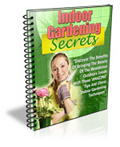Welcome to Gardening Guide
205 Indoor Organic Gardening Article

Indoor organic gardening
from:Indoor organic gardening, also referred to as holistic gardening means many different things to different people. However one thing remains constant, it is a means of growing plants only with things provided by nature. The difference between a regular organic garden and an indoor organic garden is the simple fact that one is inside a building. Many persons are embracing this mode of gardening because it is environmentally friendly. More persons are becoming more health-conscious and even more persons live in apartments.
Four good reasons why indoor organic gardening is worth exploring are:
• It helps protect the environment as little if any soil is used and there is no chemical residue released into the soil or water
• Foods are healthier because nothing synthetic such as man-made fertilizers is used on them. Vegetables especially tend to retain trace amounts of any chemicals they are treated with.
• Uses kitchen and other organic waste as fertilizers
• Gardeners who practice indoor organic gardening see cost saving not just in growing their own food but also because they forego purchasing chemicals. As a matter of fact you should be able to find just about anything you need to make a success of your indoor organic gardening project at home.
There are different types of indoor organic gardening, vegan organic gardening being one example. With the vegan organic gardening no type of animal refuse is used as compost. Hydroponics is also another popular form of indoor organic gardening.
You can start your garden from scratch or opt to purchase ready made organic gardening kits online or from brick and mortar gardening stores. Starting with seedlings is best for the beginner or those with little time as this takes out the process of transplanting and or spacing the new plants.
Because you are growing your plants indoors, and not using fertilizers, it is important to maintain the right growing conditions. The main ones are adequate lighting, correct humidity, temperature and proper watering. Plants need sunlight or an alternative source of light to grow well and make food. Temperature and humidity are also important for healthy indoor plants since they are not outside where nature regulates the environment for them. A humidifier is a good way to maintain a constant humidity levels when practicing indoor organic gardening. Make every effort to never over water.
With indoor organic gardening you can plant vegetables, herbs or just house plants. Whatever the reason for exploring indoor organic gardening, the results are well worth the effort.



